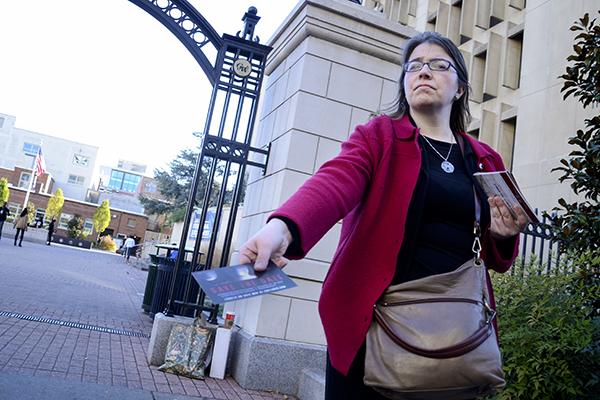Updated: Nov. 16, 2015 at 10:44 a.m.
On Nov. 19 and 20, you can experience the stories of women from across the globe, without leaving the Marvin Center.
At the first-ever Censored Women’s Film Festival, filmmakers and activists are coming together to screen movies about discrimination against women, all of which have been previously censored. The films feature marginalized and abused women to spark conversations about gender issues.
GW’s Global Women’s Institute, an on-campus organization that seeks to empower women through education, policy and outreach, will host the event. Tickets are available online now and are free for students.
The festival will show films highlighting human rights issues such as female genital mutilation, child marriages and honor killings, when a woman is murdered as a way of restoring honor to a family after she has done something wrong.
Chelsea Ullman, a policy associate at GWI, said in an email that showcasing the films at a university can engage students in such issues.
“Violence against women and girls is a global problem,” she said. “Film is a powerful way to initiate discussions which can spark social change.”
For example, the film “Honor Diaries,” about women’s rights advocates with connections to Muslim-majority societies, was criticized by the Council on American-Islamic Relations.
Other films at the festival include “India’s Daughter,” “The Cruel Cut” and “Persepolis,” all of which highlight different women’s issues around the world like rape, female genital mutilation and women’s oppression in Iran.
Voices for Choices, a pro-choice group on campus, shares the film fest’s vision for shining a light on women’s rights issues. Samantha Kovacs, the group’s co-president, explains that it’s not just about giving voices to the voiceless.
“It’s about ensuring they have opportunities to speak on their experiences and give their opinions and contribute to society in the way that other groups already can,” she said in an email. “Looking at it from a campus perspective, student groups – women’s groups and beyond – are active in making campus better, safer and a place more conducive to learning.”
The filmmakers featured are also focused on getting women’s issues seen and heard, but the attention they have received has not been all positive.
Paula Kweskin, human rights attorney and writer and producer of “Honor Diaries,” was “disappointed” by the backlash her film received from the Council for American‒Islamic Relations.
“They did not object at all to the concept of the film,” she said. “Their issue was with the filmmakers, so I guess their issue was with me. And it’s just uncontrivable to criticize a film that focuses on women’s rights and human rights. There should never be any censorship when it comes to these issues.”
Kweskin said that she’s amazed by the “domino effect” the film and movement have already had, though there is still more work to be done.
“We live in a free society and so many women around the world do not live in a free society, and they have no chance of expressing their thoughts and their wishes or even their hopes and dreams,” she said. “We have a responsibility to give a platform to lots of different ideas. We shouldn’t be censoring each other. And we certainly shouldn’t be censoring art.”
This post was updated to reflect the following correction:
The Hatchet incorrectly reported the views of the Council for American-Islamic Relations. We regret this error.







